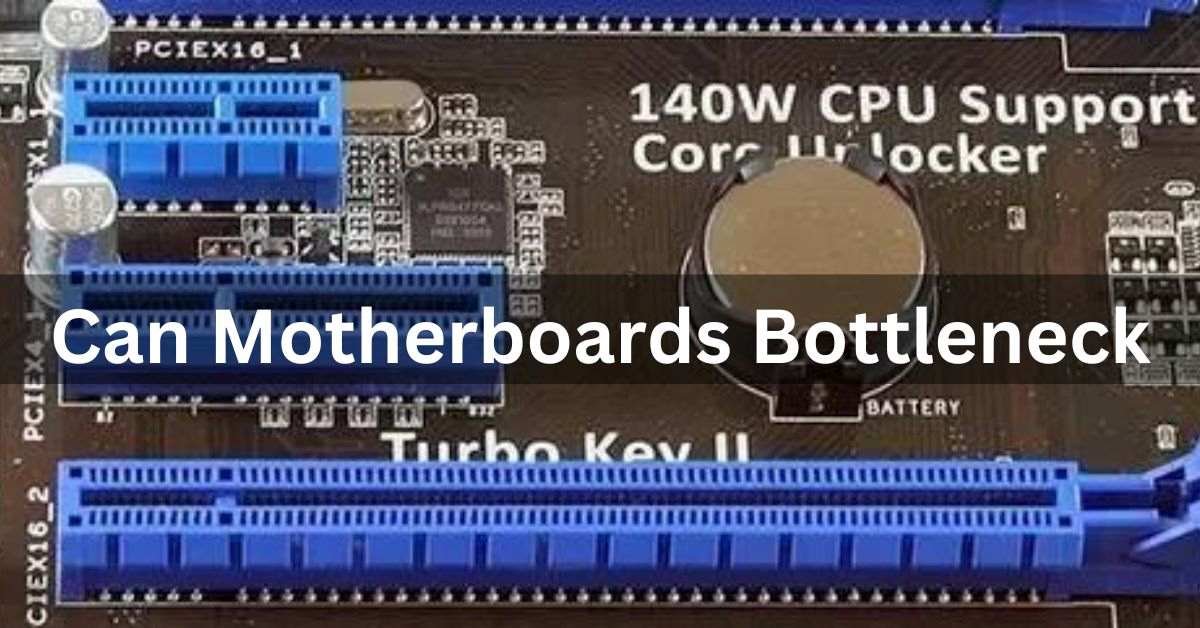In the world of computer hardware, when we talk about a ‘bottleneck’, we mean a part that holds back how well the whole system works. People usually focus on CPUs and GPUs as possible bottlenecks, but they don’t always think about how important motherboards are in this too.
Motherboards can bottleneck performance if they limit the speed or compatibility of components like CPUs, GPUs, and RAM. Choosing a suitable motherboard prevents bottlenecks and ensures optimal system performance.
In this article, we’ll explore the concept of motherboard bottlenecking, its causes, and how to address it effectively.
What Is A Bottleneck?
A bottleneck is like a narrow neck of a bottle that slows down the flow. In computers, it’s a component or limitation that restricts the overall performance of the system. It can be a slower CPU, insufficient RAM, or an outdated graphics card, hindering the system’s speed and efficiency.
Read: Ram Light On Motherboard – Comprehensive Guide – 2024
Components of a Motherboard:
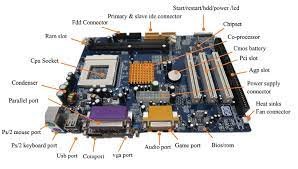
To comprehend the dynamics of bottlenecking, it’s imperative to understand the key components of a motherboard:
1. CPU Socket
The CPU socket serves as the interface between the motherboard and the processor. Different sockets support various CPU models, and compatibility is crucial for optimal performance.
2. RAM Slots
RAM slots accommodate memory modules, providing the system with temporary storage for data and instructions. The number of slots and their compatibility with RAM modules influence system memory capacity and performance.
Read: Is All Ram Compatible With All Motherboards – Complete Guide
3. Expansion Slots
Expansion slots allow for the installation of additional components such as graphics cards, sound cards, and networking cards. The type and number of expansion slots determine the system’s ability to accommodate peripheral devices.
Read: Will An Atx Motherboard Fit In An Eatx Case – Ultimate Guide!
4. Storage Interfaces
Storage interfaces, including SATA and M.2 connectors, facilitate the connection of storage drives such as hard disk drives (HDDs) and solid-state drives (SSDs). The speed and bandwidth of these interfaces impact storage performance.
Read: Do Motherboards Come With Screws – Ultimate Guide – 2024
Factors Influencing Bottlenecking:
Several factors contribute to the likelihood of bottlenecking within a system:
1. CPU and Motherboard Compatibility
Mismatched compatibility between the CPU and motherboard can lead to performance bottlenecks. It’s essential to ensure that the motherboard supports the processor’s socket type and chipset.
Read: New Motherboard Wifi Not Working – Ultimate Guide – 2024
2. RAM Speed and Capacity
Insufficient RAM capacity or slower RAM speeds than what the system demands can bottleneck overall performance, particularly in memory-intensive tasks.
Read: Asus motherboard orange light – Complete Guide – 2024
3. PCIe Lane Configurations
The allocation of PCIe lanes on the motherboard determines the bandwidth available for expansion cards. Inadequate PCIe lanes can constrain the performance of high-bandwidth devices such as graphics cards.
Read: Are All Motherboards The Same Size – Ultimate Guide – 2024
Future Trends in Motherboard Design:
As technology advances, motherboard manufacturers continue to innovate, integrating features such as faster interfaces, enhanced power delivery, and improved compatibility to mitigate bottlenecking and enhance overall system performance.
Read: Do Motherboards Have Bluetooth – Ultimate Guide – 2024
Motherboards And GPUs: How They Work Together
Motherboards and GPUs work together by providing communication and power. The motherboard hosts the GPU, connecting it to the CPU, RAM, and other components.
It provides power and data transfer pathways for the GPU to process graphics tasks efficiently, ensuring smooth visuals and overall system performance in computers.
Read: Can You Use 8 Pin 4 Pin Motherboard – Complete Guide – 2024
Can a motherboard bottleneck your CPU?
Yes, a motherboard can bottleneck your CPU. If the motherboard’s capabilities (like data transfer speed or power delivery) are lower than the CPU’s needs, performance suffers.
read: What Graphics Cards Are Compatible With My Motherboard – Complete Guide!
Causes of motherboard causing CPU bottleneck:
The causes of a motherboard causing a CPU bottleneck can include outdated chipset compatibility, limited power delivery, insufficient VRM cooling, and inadequate PCIe lane configurations. These factors can restrict the CPU’s performance potential, leading to bottlenecks in system operation.
Read: Do Motherboards Come with Standoffs – Ultimate Guide – 2024
Can The Motherboard Bottleneck RAM?
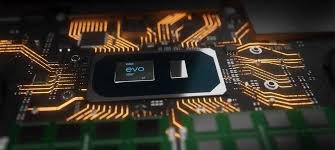
Yes, the motherboard can bottleneck RAM. If the motherboard’s memory slots or data transfer speeds are limited, it can restrict the performance of the RAM modules installed, leading to slower overall system operation and reduced efficiency.
Read: Can Old Motherboard Support New GPU – Ultimate Guide – 2024
Can A Motherboard Bottleneck Your PC?
Yes, a motherboard can bottleneck your PC. If the motherboard’s components such as the chipset, expansion slots, or connectivity options are outdated or not compatible with the CPU, RAM, or other hardware, it can limit overall system performance.
Read: Should I Connect HDMI to GPU or Motherboard – Complete Guide!
When is a Motherboard a Bottleneck?
A motherboard becomes a bottleneck when its components, such as the chipset, expansion slots, or compatibility with CPU and RAM, limit the overall performance potential of the system. This occurs when its capabilities are lower than those of other crucial hardware components.
Read: Asus Motherboard Solid Orange Light No Boot – Ultimate Guide – 2024
Can The Motherboard Bottleneck the GPU?
Yes, the motherboard can bottleneck the GPU. If the motherboard’s PCIe slots or data transfer speeds are insufficient to support the GPU’s requirements, it can hinder the graphics card’s performance, leading to lower frame rates and diminished graphical fidelity in games and applications.
Read: How Long Do Motherboard Batteries Last - Ultimate Guide - 2024
Can motherboard affect FPS?
Yes, the motherboard can affect FPS (frames per second) indirectly by influencing the performance of other components like CPU and RAM, which directly impact gaming performance.
Read: Motherboard Light Is On But No Power Up – Ultimate Guide – 2024
What can bottleneck a CPU?
A CPU can be bottlenecked by slower components like RAM or storage, as well as by demanding software or tasks that exceed the processor’s capabilities, leading to performance limitations.
Read: Can I Run 3200mhz Ram On 2400mhz Motherboard – Ultimate Guide – 2024
How bad is bottlenecking a PC?
Bottlenecking a PC can significantly reduce performance, leading to slower processing speeds and lower frame rates in games or other tasks. It limits the potential of high-end components, resulting in overall inefficiency.
Read: Is It Better To Connect Monitor To GPU Or Motherboard – Ultimate Guide – 2024
Can a motherboard bottleneck a GPU or CPU?
Yes, a motherboard can bottleneck a GPU or CPU if it doesn’t support their full potential. For example, limited PCIe lanes or outdated chipset features can restrict performance and cause bottlenecks.
Read: Are Gigabyte Motherboards Good – Ultimate Guide – 2024
Can a motherboard bottleneck a GPU or will?
Yes, a motherboard can potentially bottleneck a GPU or CPU if its specifications are not compatible or if it lacks the necessary features to support the full capabilities of the graphics card or processor, leading to performance limitations.
Read: How Long Does A Motherboard Last – Complete Guide – 2024
Can a PSU bottleneck a GPU or CPU?
Yes, a PSU (power supply unit) can bottleneck a GPU or CPU if it doesn’t provide sufficient power or if its efficiency is low. Inadequate power delivery can lead to instability, crashes, or reduced performance in demanding tasks.
Read: Are Asrock Motherboards Good – Complete Guide of 2024!
Can bottlenecking damage GPU or CPU?
No, bottlenecking can’t directly damage your GPU or CPU. It’s like a traffic jam where one component slows down the others. While it won’t harm them physically, it can reduce performance.
Read: Do Motherboards Come With Bluetooth – Complete Guide – 2024!
Can I use any graphics card with any motherboard?
Yes, generally, you can use most graphics cards with most motherboards. Just ensure that the graphics card fits physically into the motherboard’s slot and that your power supply can handle it.
Read: Asrock Motherboard Wifi Not Working – Complete Guide – 2024
The Cost Of Motherboard Bottleneck To Your PC.
The cost of motherboard bottleneck to your PC includes reduced overall performance, slower data transfer speeds, limited compatibility with newer components, and potential system instability.
Upgrading the motherboard can alleviate these issues and improve the efficiency and capabilities of your PC.
Read: Why Are Am5 Motherboards So Expensive – Guide of 2024!
How Much Will A Motherboard Bottleneck Your GPU?
A motherboard might bottleneck your GPU if it lacks sufficient bandwidth or features to support the GPU’s performance. This bottleneck can limit the GPU’s ability to communicate effectively with the CPU and other components, hindering overall system performance.
Read: Do I Need To Upgrade My Motherboard – Ultimate Guide – 2024
How To Tell If Motherboard Is Bottlenecking?
You can tell if your motherboard is bottlenecking by monitoring system performance. If the GPU isn’t performing as expected despite being powerful, and other components are up to par, it could be due to the motherboard limiting data transfer or lacking necessary features.
Read: White Light On Motherboard - Ultimate Guide - 2024
The Role Of The Motherboard In A GPU Bottleneck.
The motherboard plays a crucial role in a GPU bottleneck by serving as the communication hub between the GPU and other components. If the motherboard lacks sufficient bandwidth or features, it can hinder data transfer speeds, limiting the GPU’s performance potential.
Read: Green Light Motherboard – Complete Guide – 2024
Why is bottleneck a problem?
A bottleneck is a problem because it slows down overall system performance. It occurs when one component restricts the speed or efficiency of the entire system, limiting its capabilities and responsiveness.
Read: Motherboard Yellow Light – Complete Guide – 2024
Is the motherboard a bottleneck and is the CPU fan too big?
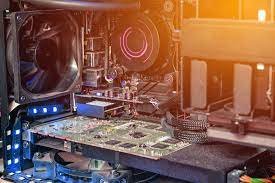
The motherboard might be bottleneck if it can’t support CPU features. A CPU fan can’t be too big unless it obstructs components. Check compatibility for optimal performance.
Is This mobo a bottleneck?
Whether the motherboard is a bottleneck depends on its features and compatibility with other components. Consider factors like CPU support and connectivity to determine its performance impact.
Can a Motherboard bottleneck a GPU or will bottlenecking only occur with a GPU’s and CPU’s interaction?
Yes, a motherboard can bottleneck a GPU if it lacks proper PCIe slots or bandwidth. However, bottlenecking commonly occurs due to the interaction between the GPU and CPU, where one component outperforms the other, limiting overall performance. Compatibility matters for optimal performance.
Can an old GPU be incompatible with newer motherboards?
Yes, an old GPU can be incompatible with newer motherboards due to differences in PCIe standards or lack of driver support. Ensure compatibility by checking specifications before installation.
Read: Process Lasso Error Setting Process CPU Affinity – Ultimate Guide – 2024
How do I know if my motherboard is bottlenecking my CPU?
To check if your motherboard is bottlenecking your CPU, monitor CPU usage while performing tasks. If the CPU isn’t running at full capacity and other components are up to date, the motherboard might be bottlenecking.
Read: What Is Aafp On Motherboard – Ultimate Guide – 2024
Can Motherboard cause low GPU usage?
Yes, a motherboard can cause low GPU usage if it has insufficient PCIe bandwidth or compatibility issues. Ensure the motherboard supports the GPU and has the necessary resources for optimal performance.
Read: Orange Motherboard Light – Complete Guide – 2024
Can a motherboard throttle a GPU?
Yes, a motherboard can throttle a GPU if it doesn’t provide adequate power or PCIe bandwidth. Compatibility issues or outdated firmware can also lead to throttling, affecting GPU performance.
Read: Can I Use 70 Alcohol To Clean CPU – Ultimate Guide – 2024
Is My motherboard compatible with my graphics card?
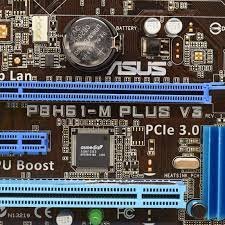
To check compatibility between your motherboard and graphics card, ensure the motherboard has the appropriate slot (like PCIe) for the graphics card. Consult manuals or manufacturer websites for compatibility info.
FAQs:
1. Can your motherboard bottleneck your GPU and CPU?
Yes, your motherboard can bottleneck your GPU and CPU. This happens when the motherboard’s components limit the speed at which the GPU and CPU can communicate and process data.
2. Will a bad motherboard cause a PC to bottleneck?
Yes, a bad motherboard can cause a PC to bottleneck. If the motherboard’s components are faulty or outdated, they may limit the performance of the CPU and GPU, creating bottlenecks in processing.
3. Is it possible for a processor to bottleneck an SSD?
No, a processor typically does not bottleneck an SSD. SSDs rely more on storage and data transfer speeds, while processors focus on computing tasks. They usually operate independently without one bottlenecking the other.
4. Will an Intel B75 motherboard be enough for an Intel Core i5-8400? I’m pairing this CPU with my Nvidia GeForce GTX 1050 Ti, since I have a huge bottleneck (1050 Ti is currently paired with Intel i5-2500. Does it even matter what motherboard I have?
Yes, an Intel B75 motherboard will work with an Intel Core i5-8400, but it may limit some features of the CPU. Upgrading from your i5-2500 may alleviate the bottleneck.
5. Can motherboards bottleneck your gaming system?
Yes, motherboards can bottleneck gaming systems if their components limit the performance of the CPU, GPU, or memory. Choosing a compatible and well-equipped motherboard helps prevent bottlenecks.
6. Will an i3 10105F bottleneck an RX 6600?
Yes, the Intel Core i3 10105F may bottleneck the performance of the AMD Radeon RX 6600, particularly in demanding gaming scenarios or tasks that heavily rely on CPU processing power.
7. Will a bad motherboard cause a PC to bottleneck?
Yes, a bad motherboard can cause a PC to bottleneck by limiting the performance of the CPU, GPU, and other components due to issues like outdated or faulty connectors and features.
8. How can a graphics card bottleneck a CPU/motherboard?
A graphics card can bottleneck a CPU/motherboard if it processes graphics faster than the CPU/motherboard can handle, leading to performance limitations and slower overall system performance.
9. Is a PC build bottleneck calculator accurate?
A PC build bottleneck calculator can give you an idea, but it’s not always 100% accurate. It helps estimate potential bottlenecks in your system’s performance.
10. Can I use a 32 MB GPU from the 2000s on new motherboards? I just want to be able to see something and my CPU doesn’t have an GPU.
Yes, you can use a 32 MB GPU from the 2000s on newer motherboards. It should work for basic display functions. However, don’t expect it to handle modern graphics-intensive tasks smoothly due to its limited capacity and outdated technology.
Conclusion:
In conclusion, understanding how motherboards can bottleneck performance is crucial for optimizing computer systems. By recognizing compatibility issues and ensuring adequate component support, users can prevent bottlenecks that hinder overall efficiency. Choosing suitable motherboards with updated features can enhance system performance and prevent limitations in CPU, GPU, and RAM utilization.
